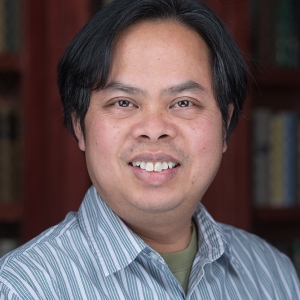Bunkong Tuon, associate professor of English
"Gruel"
We were talking about survival / when my uncle told me this. / “When you were young, / we had nothing to eat. / Your grandmother saved for you / the thickest part of her rice gruel. / Tasting that cloudy mixture of salt, / water, and grain, you cried out, / “This is better than beef curry.” All my life I told myself I never knew / suffering under the regime, only love. / This is still true. (Previously published in Numero Cinq)
Like most of Bunkong Tuon’s poetry, “Gruel” is fact. It happened.
“We were cleaning up after a niece’s birthday party. Maybe it was the leftover food, but the conversation turned to survival under the Khmer Rouge, when food was scarce,” Tuon reflected. “My uncle told me the story and I remember his friend said, ‘Your grandmother loves you so much that she risked her life to feed you.’”
“If she were caught with a few unaccounted grains of rice,” he added, “she would have been taken away and possibly never seen again.”
Orphaned by the brutal regime, Tuon escaped Cambodia as a small child in 1979, thanks to his grandmother and extended family. Their shared history and heritage, as well as his experience growing up an immigrant in Massachusetts, inspire his poetry.
“I write to make sense of my life. I grew up without parents and in a place where, at the time, I was one of a few Asians in my school,” he said. “I felt estranged, alienated from my surroundings.”
“Words give me a sense of control,” Tuon continued. “And writing is a way for me to honor my family, to share their stories of survival and love.”
It’s also a way for him to offer something special to readers.
“I find the themes of hope and rejuvenation important,” Tuon said. “No matter what happens, as long as you are alive and breathing, you must persevere, survive, change things, and make life better for you, your family and the rest of the world.”
To read a sampling of Bunkong Tuon’s poetry, click here. His book, Gruel, is available on Amazon.


